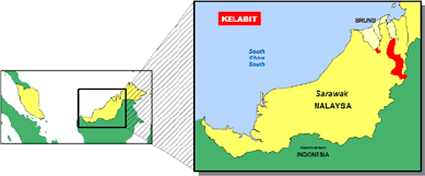Kelabits are an ethnic group in Malaysia with a small number living in Indonesia. The main Kelabit settlement is in northeast Sarawak, Malaysia. The Kelabit heartland, Bario lies 1,000 meters above sea level in the remote Kelabit Highlands. Bario is accessible only by air transport. Sixteen Kelabit villages are located within this highland plateau, while four other villages are located in the lowlands along the tributaries of the Baram River.
The Kelabit's ancestors were traditionally farmers and headhunters. The Kelabit of today live a more progressive life. Many have migrated to urban areas for work or further education.
Most Kelabit villages are longhouse settlements. The rural Kelabit plant wet-paddy produces high-quality rice commonly known as 'Bario Rice'. They also cultivate fruits and raise buffaloes, sheep, and cattle. The people hunt and fish when the rice-planting season is over. The level of education among the Kelabit is considerably high. Many work in the civil service and the private sector in major urban areas.
The Kelabit are a close-knit community, noted for their cheerful, industrious and refined nature and generous hospitality. Family life and friendships are highly valued in their society. A Kelabit couple may mark their new status as parents and grandparents by changing their names at a special festive ceremony called Irau Naru Ngadan.
Kelabits are good dancers. Well-known dances include the Arang Papate (The Dance of War) and the graceful Arang Menengang (The Dance of the Hornbill).
Singing, story-telling and joke-sharing sessions are popular traditional pastimes. Games such as soccer and volleyball are also popular among them.
The Kelabit highly values antique beads. These centuries-old valuable beads are not only used as body adornments but also serve as family heirlooms.
The Kelabit's forefathers were fervent animists. They appeased spirits and depended on the sighting of certain animals to warn them of impending disaster. Certain taboos and bad omens required the abandonment of ripening rice crops, the dissolution of marriages and even the killing of newborn infants.
The arrival of Christianity in the 1940s saw the Kelabit discarding most of their old beliefs. Most Kelabit today are Christians. Christmas and Easter are two important festivals celebrated as a community.
The large migration of the younger generation to the urban areas has resulted in a shortage of manpower in the rice fields. The remote location of the Kelabit Highlands often forces schoolchildren to complete their education in faraway places. Many villages are now left with only the elderly and the very young.
Pray for the living testimony of believers to other people in their area.
Pray for the Kelabits to put their faith into action by reaching others for Christ.
Pray for the Lord to bless them spiritually and physically in the coming years.
Scripture Prayers for the Kelabit in Malaysia.
Southeast Asia Link – SEALINK, Copyrighted © Used with permission.
| Profile Source: Joshua Project |











